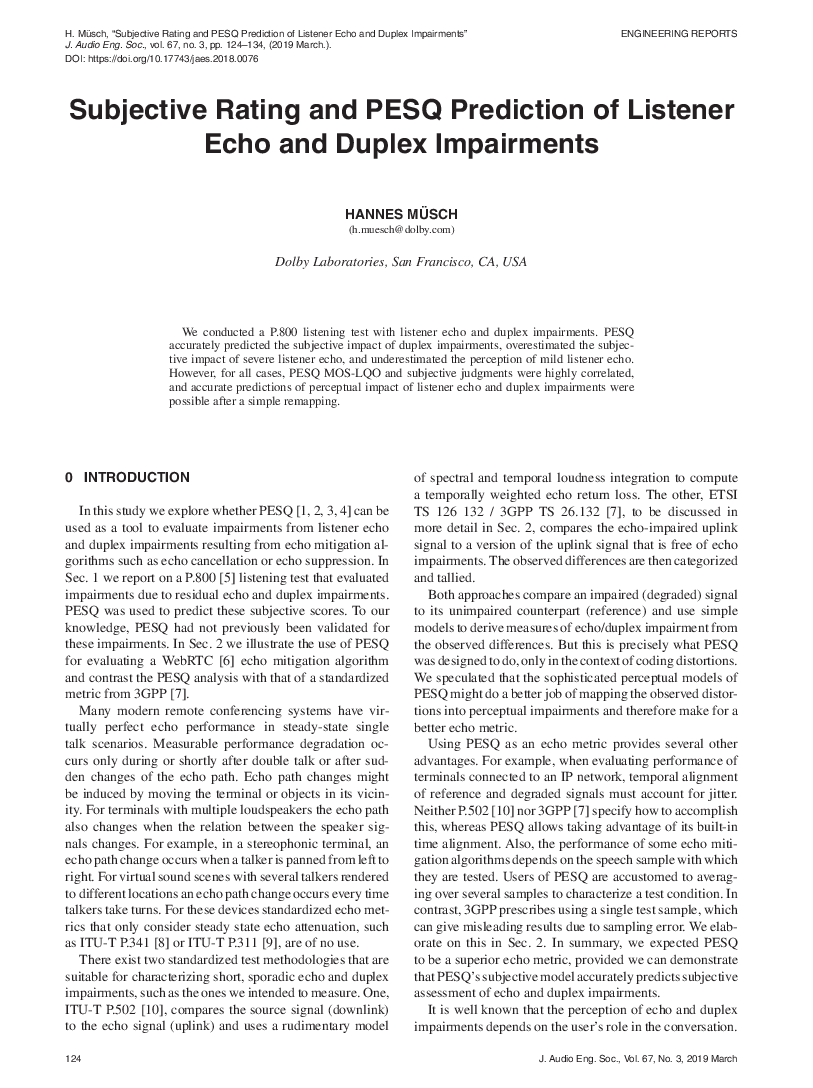Home / Publications / E-library page
You are currently logged in as an
Institutional Subscriber.
If you would like to logout,
please click on the button below.
Home / Publications / E-library page
Only AES members and Institutional Journal Subscribers can download
This study shows that PESQ can be used as a tool to evaluate degradations from listener echo and duplex impairments caused by echo-mitigation algorithms such as echo cancellation or echo suppression. Both the PESQ-based metric and standards 3GPP TS 26.132 and P.502 share the approach of testing with real speech and comparing an impaired signal to an unimpaired reference. However, unlike 3GPP/P.502, PESQ provides tools for accurate time alignment of the signals that function even with temporally varying delay (jitter) and thus allow measurement in IP-based networks. Moreover, the PESQ metric follows the common practice of calculating PESQ values for any test condition with several speech samples, which stabilizes the quality estimate. In contrast 3GPP prescribes the use of a single test signal, which causes potentially misleading sampling error. Finally, the well-developed perceptual model underlying PESQ generates a perceptually relevant one-dimensional result. This is suitable for benchmark or regression testing. In contrast 3GPP and P.502 use only rudimentary perceptual models or no models at all and generate multidimensional results that are unwieldy when used for performance comparison or tracking
Author (s): Müsch, Hannes
Affiliation:
Dolby Laboratories, San Francisco, CA, USA
(See document for exact affiliation information.)
Publication Date:
2019-03-06
Import into BibTeX
Permalink: https://aes2.org/publications/elibrary-page/?id=19893
(233KB)
Click to purchase paper as a non-member or login as an AES member. If your company or school subscribes to the E-Library then switch to the institutional version. If you are not an AES member Join the AES. If you need to check your member status, login to the Member Portal.

Müsch, Hannes; 2019; Subjective Rating and PESQ Prediction of Listener Echo and Duplex Impairments [PDF]; Dolby Laboratories, San Francisco, CA, USA; Paper ; Available from: https://aes2.org/publications/elibrary-page/?id=19893
Müsch, Hannes; Subjective Rating and PESQ Prediction of Listener Echo and Duplex Impairments [PDF]; Dolby Laboratories, San Francisco, CA, USA; Paper ; 2019 Available: https://aes2.org/publications/elibrary-page/?id=19893